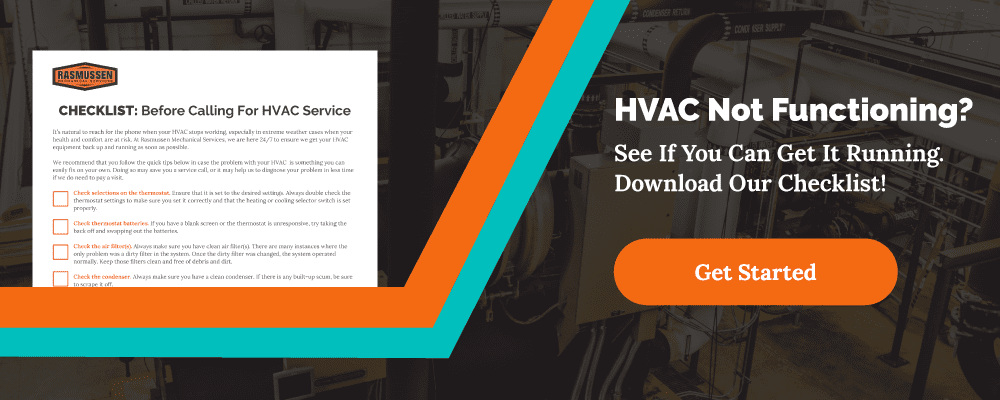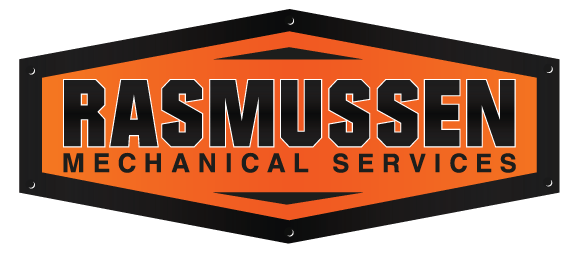Have you ever noticed when your heat or air conditioning isn’t running full force, especially during those hot muggy days or cold windy nights? You may not know exactly what’s wrong, but you suspect something has to be broken, which only leads you to believe “what’s it going to cost?” You may hear strange noises, find a leak, or discover that your unit is continually running and you are never comfortable (and neither is anyone else).
Airflow issues
Our team put together the most common causes of your discomfort that will help you identify and maybe even correct the problem before it gets worse. In the end, you’ll be able to help prevent future damage or repairs, while saving money!
@RasMech is diving into your common #HVAC issues and helping you identify what causes these problems. Take a look: Share on XHere are some things to watch out for if you suspect an HVAC issue:
- Look for hot and cold spots throughout your building. Hot and cold spots are often one of the first signs of HVAC airflow issues.
- Pressure imbalance. Do you have doors slamming behind, strange whistling noises, and drafty areas? These are symptoms of air pressure problems caused by poor airflow from the HVAC system.
- Refrigerant leak. Your air conditioner shouldn’t leak refrigerant. You should suspect a leak if the system is not operating as well as it should, or if cool (not cold) air is barely coming out. If the refrigerant has leaked out, the compressor will run hot and eventually seize up if your inside coil (evaporator) doesn’t freeze first!
- Corrosion of wires and terminals. You may notice your air conditioner going on and off frequently and before the thermostat is at setpoint. This is an indication that wires and terminals are corroded or loose. Your HVAC technician should inspect them and replace any that are corroded. Otherwise, the sporadic operation will wear out the fan and compressor quickly.
- No air is coming out, weak air or low airflow from vents in your house or commercial space. The problem could be throughout the space, or you could have one AC vent not blowing air in one room.
- Loud noises. You may hear unusual squealing, grinding, or rasping in your equipment when it comes on. These noises are an indication that components such as belts and bearings are wearing out.
Finally, and a telltale sign your HVAC needs some help, your AC system blows warm air.
[Not sure how to keep your HVAC’s ventilation system up and running for optimal efficiency? No fear! Read: Reducing Stress on Your HVAC Equipment.]
Causes of Low HVAC Airflows
You might have experienced or are currently experiencing the issues stated above and want to know what would cause such a mess of frustration. Our team compiled five of the most common causes affecting your HVAC airflow below:
Dirty or Clogged Filters
A dirty air filter can stop the airflow in its tracks. If your HVAC system is not running correctly, the filter should be the first thing you check. Keep a schedule and change these on time to save money.
When was the last time you changed your air conditioner’s filter? That filter has a crucial job: to remove dust and debris from the air and keep it out of your equipment and your ducts. If the filter gets overloaded and clogged, it impedes your HVAC airflow, leading to hot & cold spots, stuffy air, frozen coils, and higher electrical bills. Debris in the equipment can damage parts as well. Be sure to change your filters at the recommended intervals to prevent this common airflow problem. That could mean as frequently as once a month.
Blocked or Leaking Ducts
What happens to all the dust that gets past your clogged AC filters? It winds up accumulating in the ductwork. A buildup of dust can be compounded by ductwork that’s too small for the capacity of your air conditioner, while a flexible duct can be more restrictive. Ducts that are already too narrow can become easily clogged. Especially if you’re in an older building, it’s also not unheard of for rodents, birds, or insects to build nests in HVAC ducts.
The walls of the ductwork can also develop holes or cracks where air leaks out. Sometimes, it can get disconnected in the ceiling! A leak in your ductwork will divert the flow of air, and it is easy to overlook these small leaks. Be sure to check the ductwork carefully by examining the ducts for cracks and holes that could be preventing the air from flowing correctly. All of these ductwork issues lead to reduced airflow for heating and air conditioning.
Loud noises, leaks, and stuffy air can be an issue when it comes to your HVAC. @Rasmech identifies the main issues and causes that your HVAC can experience. Take a look: Share on XFaulty Thermostat
You might not realize it, but a defective thermostat can cause all kinds of problems with your HVAC unit and its airflow. If your HVAC unit seems to be running properly, but your home feels stuffy, you should have your thermostat checked and replaced if necessary. Sometimes, something as simple as a faulty thermostat, or even a low battery can be the cause of HVAC airflow problems.
Improper Sizing
Another factor of a lack of airflow can be the improper sizing of your unit. If the unit is too big for your residence, it could impact the flow of air and reduce the efficiency of the entire unit. This problem is more common than you might imagine. Years ago, the thinking was “bigger is better” when it comes to HVAC sizing.
Today we know that units with a capacity too large for a certain area run inefficiently, cycling on and off too frequently, and do not dehumidify the space well. They never run long enough to remove humidity from the space, making it feel stuffy and uncomfortable. It’s important to always make sure your HVAC system is properly sized for your home or building – neither too big nor too small.
Dirty Coils
Dust and dirt can accumulate on the coils, decreasing the efficiency of the HVAC unit and causing problems with airflow. These dirty coils are all too common, and all too easy to overlook.
Your air conditioner’s condenser coil is another part with an important job to do: release the heat that needs to be removed from your space. Since it’s part of the outdoor unit and exposed to the elements, the coil can get so dirty it can’t release heat. Then your unit has to work harder (and hotter) trying to cool your space. The result can be those HVAC airflow issues. Be sure to check the coils carefully, cleaning them as needed (usually once or twice a year).
With Rassmussen on your side, our HVAC services are customized to your unique mechanical or maintenance needs to provide you with preventative, predictive, and proactive solutions and guidance. From blocked or clogged air filters to improperly sized equipment, our experts can help. With decades of experience, Rasmussen pairs seasoned knowledge with up-to-date technology to provide comprehensive HVAC services that center around your needs, decrease energy consumption, communicate technical expertise effectively, and more!
Speak with an HVAC expert today!



